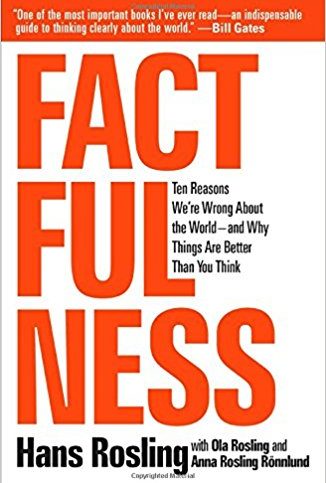Book Recommendation: The Fifth Risk
Here’s a test: what single catastrophe killed more people worldwide than any other? It was the Spanish flu epidemic of 1918, which killed 50-100 million people, probably more people than the two world wars combined.[1] One contributor to the death toll was the fact that countries then at war suppressed information about it, which made it less likely to be contained. And one reason that we haven’t had a recurrence within several orders of magnitude of that is that governments around the world, especially the US government, gather and freely share huge amounts of data on diseases.
The average citizen is well aware of the dangers of nuclear war, terrorism and crime, so we accept and even embrace the institutions and people who protect us from them, such as the military, Homeland Security and first responders. When risks are vivid and potentially catastrophic, we don’t mind throwing vast sums at them, because we “get it”.
But it’s the less obvious risks that may threaten us the most in the long run, precisely because we don’t think enough about them and we begrudge every penny spent on preventing them. We don’t pay that much attention to weather, contaminated food, or insufficient health care and nutrition, but they have killed far more Americans than the more easily imagined risks.
It takes a gifted writer such as Lewis (Liar’s Poker, Moneyball, The Big Short) to make us understand and care about the “fifth risk”: project management. This refers to the enormous array of projects that the Federal government runs to address these hidden systemic risks, and the vast amount of data that makes that possible. So many of those projects and data are under threat today.
The average citizen does not understand data in general and does not care about it, unless maybe it’s about their fantasy football team. More specifically, the average citizen does not know:
- How much their safety and prosperity depend on national data—its collection, storage, analysis and application
- Who does most of the collection, storage, analysis and application
- Why that system is under threat today
The book is fascinating because Lewis is a master at telling the stories of interesting, dedicated individuals who work at all levels within the Federal government. Most of us think of them as grey, faceless bureaucrats, even “lazy or stupid” (I have to admit I’ve been guilty of that myself) but many of them are doing fascinating and even thrilling work. Lewis introduces us to unsung heroes who are smart enough to make far more money in the private sector but do what they do for reasons other than money: the mission, wanting to make a difference in people’s lives, a sense of being called to serve.
It also introduces us to the work that Federal agencies such as Commerce, Energy, and Agriculture do that save us from risks potentially as deadly or even worse than foreign enemies. Unfortunately, they’re like the offensive linemen of the Government, because they usually only get noticed when they fail. How many people are alive today because hurricane forecasts have become so much better? How many people are alive today because they did not die from the flu, or because the electricity grid has not succumbed to the half million cyber intrusion attempts it suffers per year? How many kids avoid malnutrition because of government programs, or how many more people avoided becoming victims of violent crime? You can thank government for that, because they are the only institutions who have the resources to collect the data to understand the problems and design and implement projects large enough to solve them.
The book is disturbing because many of those projects are at risk. They’ve always been at risk when politicians strive to cut budgets (and there’s no doubt a lot of fat and waste that needs cutting), but the present administration takes it to a whole different level. It’s a level that is not just oblivious to data, but openly hostile to it—willful ignorance, if you will. It’s the only administration that did not send large transitions teams to learn all about the agencies they were about to take over, to ensure a smooth handoff.
And as this administration took over, DJ Patil, the government’s Chief Data Scientist, “watched with wonder as the data disappeared across the Federal government,” such as links to climate change data, inspection reports of businesses accused of animal abuse, records of consumer complaints, even detailed crime data, and of course anything having to do with climate change. It doesn’t matter whether you’re Democrat or Republican, that’s data that you and I paid for, and they’re taking it away from us.
Why does this matter? The first answer is that the less data you have, the greater the chance that undetected risks will come to pass. The second answer is more fundamental: when government depends on the consent of the governed, how can making the governed less informed be a good thing?
This post is a little outside my usual persuasive communication content, but as a reader of this blog you probably care about clear thinking, supported by hard facts, so I strongly recommend you read The Fifth Risk.
[1] “A Deadly Touch of Flu”, The Economist, September 29, 2018, p.75.




